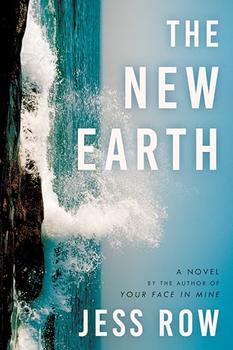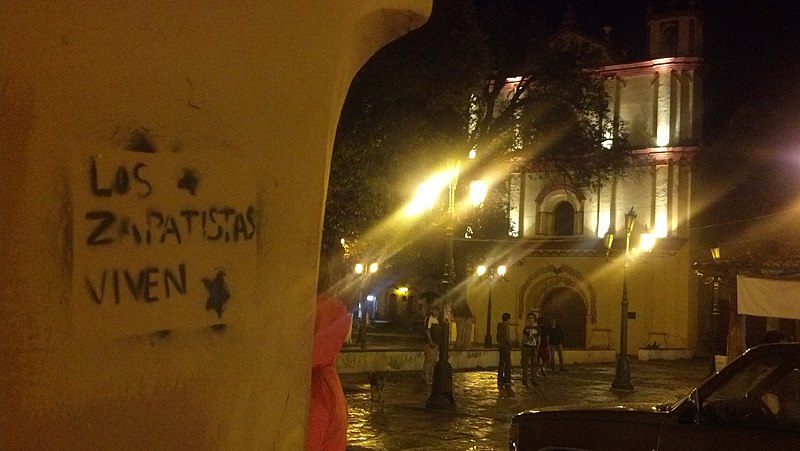Summary | Excerpt | Reviews | Beyond the Book | Read-Alikes | Genres & Themes | Author Bio

A Novel
by Jess RowThis article relates to The New Earth
 In Jess Row's novel The New Earth, the character Zeno's mother was a Zapatista in Chiapas, the southernmost state in Mexico, where she was killed. The Zapatistas are an indigenous peasant movement from Chiapas named for the Mexican Revolution leader Emiliano Zapata. They formed in 1983, organized secretly for 10 years, and then gained worldwide recognition in 1994, when they incited a rebellion against the government. The resistance movement still exists today and remains proudly undefeated by the state.
In Jess Row's novel The New Earth, the character Zeno's mother was a Zapatista in Chiapas, the southernmost state in Mexico, where she was killed. The Zapatistas are an indigenous peasant movement from Chiapas named for the Mexican Revolution leader Emiliano Zapata. They formed in 1983, organized secretly for 10 years, and then gained worldwide recognition in 1994, when they incited a rebellion against the government. The resistance movement still exists today and remains proudly undefeated by the state.
Mexico has the largest indigenous population in Latin America, and Chiapas is over one-quarter indigenous. Indigenous people have historically been excluded from basic services such as education and healthcare there; and although Chiapas is one of the wealthiest states in Mexico in terms of natural resources (including 30% of Mexico's fresh water supply), it has the highest poverty rates of all of the country's 32 states. The Zapatista Army of National Liberation (EZLN), an armed guerrilla organization, was formed out of these conditions, intent on representing the rights of Chiapas' indigenous people and demanding the Mexican government put an end to indigenous segregation and oppression.
On January 1, 1994, the EZLN protested the adoption of NAFTA (the North American Free Trade Agreement), because they knew that free trade, and neoliberalism and globalization in general, would have a devastating effect on Mexico's agricultural workers and rural communities. Armed members of the Tzotzil, Tzeltal, Ch'ol and Tojolabal indigenous peoples—some barefoot, some carrying antique or wooden guns—took over cities all around Chiapas, freeing prisoners, burning military outposts and claiming the ranches of rich landowners. Their rebellion made them instant heroes on the left.
Notably, one-third of the EZLN insurgents were women; from the beginning, Zapatista leaders insisted that women could participate at all levels, and in 1993, a year before their rebellion, they had passed the Women's Revolutionary Law, which established basic rights for women, including political participation.
Subcomandante Marcos, the most prominent member of EZLN leadership, famously stated on the day of the 1994 revolution that the "fourth world war against neoliberalism and oblivion" had begun. In their First Declaration from the Lacandon Jungle, the EZLN declared: "We, the men and women of the EZLN, full and free are conscious that the war that we have declared is a last resort, but also a just one… we ask for your participation in and support of this plan that struggles for work, land housing, food, healthcare, education, independence, freedom, democracy, justice, and peace."
In response to the uprising, the Mexican government sent an army of tanks, soldiers and helicopter gunships to quash the rebellion, but the state failed against the Zapatista guerillas. Mexico was forced to sign the 1995 San Andrés Accords, in which the country recognized indigenous peoples' collective rights, but perhaps unsurprisingly, the government continued to terrorize rebel sympathizers and their families in order to drive the Zapatistas out of public life.
But the Zapatistas were never defeated, and have never disarmed. Instead, they have created a society in the Lacandon Jungle that is organized against the increasing neoliberalization of Mexico, and is based on collective production and services.
A Tzotzil Zapatista woman—who was masked so as to not reveal her identity—told a journalist in 2018: "We do not need the government. We do not use them. We have our own indigenous government. We have different problems now, but we are finding the solutions ourselves. It is much better. There are many more of us, too… We are developing a new form of governance. The decisions [about how we live] are now made by the communities, not by government."
Editor's update: As of November 2023, the Zapatistas announced plans to dissolve their "autonomous municipalities," but it has been suggested that they have intentions to continue organizing at a community level.
Graffiti on a wall of the historic center of San Cristóbal de Las Casas, Chiapas, México that reads "Los Zapatistas viven" (The Zapatistas live).
Photo by Emiglex (CC BY-SA 4.0)
Filed under Places, Cultures & Identities
![]() This "beyond the book article" relates to The New Earth. It originally ran in June 2023 and has been updated for the
July 2024 paperback edition.
Go to magazine.
This "beyond the book article" relates to The New Earth. It originally ran in June 2023 and has been updated for the
July 2024 paperback edition.
Go to magazine.
Your guide toexceptional books
BookBrowse seeks out and recommends the best in contemporary fiction and nonfiction—books that not only engage and entertain but also deepen our understanding of ourselves and the world around us.